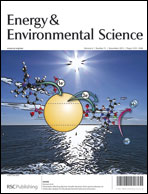Copper-based catalysts for the efficient conversion of carbohydrate biomass into γ-valerolactone in the absence of externally added hydrogen†
Abstract
The direct production of γ-valerolactone (GVL), an essential component for next-generation biorefineries, by a straightforward conversion of bio-derived levulinic acid (LA)/formic acid (FA) streams without the externally added fossil-fuel H2 has rarely been achieved. We describe here a sustainable, cost-effective and highly efficient protocol for directly converting a 1 : 1 aqueous mixture of LA and FA into GVL in high yields. The process is catalyzed by an earth-abundant and robust copper-based metal oxide catalyst, in which the high performance of the copper catalyst for the in situ generation of hydrogen gas in the systems by the highly selective decomposition of FA in an aqueous medium is essential. This catalytic system is also effective with raw cellulosic biomass, such as giant reed, as the starting material, thus paving a new way toward a renewable chemical industry.


 Please wait while we load your content...
Please wait while we load your content...